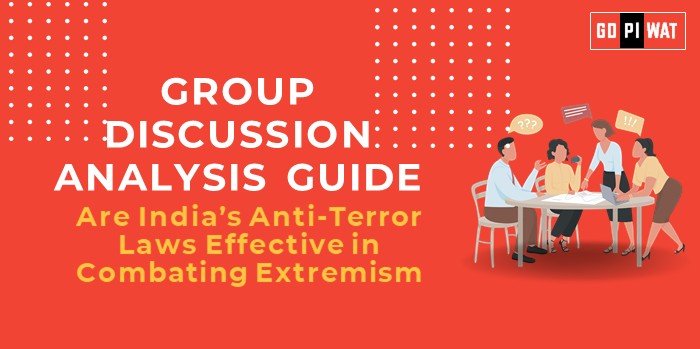📋 GD Analysis Guide: Are India’s Anti-Terror Laws Effective in Combating Extremism
🌐 Introduction to the Topic
- ⚖️ Opening Context: India, as one of the world’s most populous democracies, faces persistent challenges from extremism and terrorism. Anti-terror laws are pivotal in safeguarding national security and maintaining peace.
- 📜 Topic Background: India’s legal framework includes acts like the Unlawful Activities (Prevention) Act (UAPA), 1967, and the National Investigation Agency (NIA) Act, 2008. These laws aim to deter terrorism while balancing human rights. Recent amendments, including the UAPA Amendment Act, 2019, and high-profile cases of terror attacks, have reignited debates on their effectiveness.
📊 Quick Facts and Key Statistics
- 📉 Terrorist Incidents (2023): 220 cases recorded, marking a decline from previous years (Source: NCRB).
- ⚖️ Conviction Rate of UAPA Cases: 27.5% (2022), reflecting enforcement challenges.
- 🌍 Global Terrorism Index (2023): India ranked 13th, showing significant vulnerability to extremism.
- 💰 Budget for Anti-Terror Agencies: ₹10,000 crore allocated to the NIA (2023-24), emphasizing resource prioritization.
👥 Stakeholders and Their Roles
- 🏛️ Government: Enacts laws and funds agencies like the NIA, IB, and state police.
- ⚖️ Judiciary: Ensures adherence to constitutional rights while enforcing anti-terror laws.
- 🛡️ Security Forces: Execute counter-terror operations, including intelligence gathering.
- 📢 Civil Society and NGOs: Monitor human rights compliance and promote rehabilitation of individuals influenced by extremism.
- 🌐 International Bodies: Collaborate with India on counter-terrorism strategies through platforms like FATF and INTERPOL.
🏆 Achievements and Challenges
✨ Achievements:
- 💵 Reduction in Terror Financing: UAPA has led to a crackdown on financial networks supporting terrorism.
- 📂 Improved Investigations: Enhanced coordination through the NIA has led to over 350 cases solved since 2008.
- 🌍 International Collaboration: Efforts like hosting the Interpol General Assembly in 2022 have bolstered global partnerships.
⚠️ Challenges:
- 🚫 Alleged Misuse: Concerns over political misuse have led to criticism from human rights groups.
- 📉 Low Conviction Rates: Reflects systemic issues in evidence collection and prosecution.
- 🕒 Overburdened Judiciary: Law enforcement agencies face delays in resolving cases effectively.
🌏 Global Comparisons
- 🇬🇧 UK’s Counter-Terrorism Act: Focuses on preventive measures and de-radicalization programs.
- 🇺🇸 US Patriot Act: Known for stringent surveillance but criticized for privacy infringements.
📖 Case Study:
- 📂 Pulwama Attack (2021): Highlighted operational success but exposed gaps in intelligence sharing.
🗣️ Structured Arguments for Discussion
- ✅ Supporting Stance: “India’s anti-terror laws have successfully dismantled numerous terror networks and reduced large-scale incidents.”
- ❌ Opposing Stance: “The misuse of anti-terror laws undermines human rights and raises concerns about judicial overreach.”
- ⚖️ Balanced Perspective: “While these laws are crucial, their implementation must align with democratic values and judicial scrutiny.”
💡 Effective Discussion Approaches
✨ Opening Approaches:
- 📊 Data-Driven: “With 220 terror incidents in 2023, India’s anti-terror laws have played a vital role in mitigating threats.”
- 📂 Case-Based: “The Pulwama attack investigation highlights both strengths and weaknesses of India’s counter-terror framework.”
🔄 Counter-Argument Handling:
- ⚖️ Low Conviction Rates: “These rates highlight the need for better legal procedures, not the inadequacy of laws.”
- 🔍 Misuse Concerns: “Implementing stricter oversight mechanisms can mitigate potential abuses.”
⚡ Strategic Analysis of Strengths and Weaknesses
- 💪 Strengths: Comprehensive legal framework; increased resource allocation for counter-terrorism.
- 🚫 Weaknesses: Alleged misuse; low conviction rates; inadequate focus on rehabilitation and de-radicalization.
- 🚀 Opportunities: International collaboration for intelligence sharing; leveraging technology for counter-terrorism.
- ⚠️ Threats: Rising cyber terrorism and cross-border infiltration.
📚 Connecting with B-School Applications
- 🏢 Real-World Applications: Exploring public policy on counter-terrorism in projects; analyzing the economic impact of terrorism for finance or operations roles.
- 🤔 Sample Interview Questions:
- 📜 “What lessons can India learn from international counter-terror laws?”
- ⚙️ “How can technology improve anti-terror frameworks?”
- 💡 Insights for Students: Understanding the balance between national security and human rights; exploring the role of leadership in crisis management.


